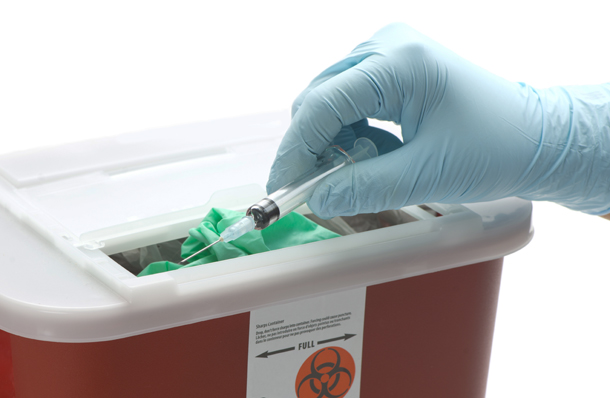If you’re regularly dealing with medical waste, proper management and disposal are required to ensure safety and overall health, especially in healthcare facilities. It’s crucial to know the importance of learning the proper practice of Disposal Tips for Medical Waste. The incorrect handling of medical waste can put both healthcare providers and clients at risk while also leading to legal consequences that can be burdensome in the long run.
What are the Types of Medical Wastes?
Medical waste will always be part of the process, and it’s something that you shouldn’t take for granted. Remember that medical waste requires proper disposal, but it can be difficult without knowing the type of waste you have.

There are 4 types of medical wastes.
Infectious Waste – It’s any waste that poses a threat of infection, including blood-soaked bandages, human or animal tissue, surgical gloves, stocks, cultures, or swabs.
Hazardous Waste – These wastes can affect humans in non-infectious ways, including old medications, chemicals, and sharps.
Radioactive Waste – It’s any type of waste from nuclear medicine treatments, cancer therapies, and medical equipment with radioactive isotopes.
General Waste – Most medical waste is under this category, including paper, liquids, plastic, or anything that doesn’t fit into the previous classes.
It’s best to work with a professional for proper disposal when dealing with medical waste. Checking out Same-Day Rubbish Removal and others would be a good starting point.
Proper Management and Disposal tips for Medical Waste
In any facility that produces medical waste daily, it’s crucial to be ready with an efficient plan for managing the wastes. Here are several tips on the management and disposal Tips for Medical Waste:
1. Work with Waste Disposal Professionals
When it comes to medical wastes, consider working with a professional to ensure proper management and disposal. You don’t want to rush through the procedure and make costly errors along the way. Remember that medical waste requires proper packaging in leak-proof containers that comply with specific puncture and drop tests.
2. Practice Proper Storage
If you’re dealing with medical waste, it’s best to ensure that everything goes into a labeled container since anything that comes in contact becomes contaminated. The best way to prevent contamination is to implement proper labeling and organization of the wastes.
Waste products that contain mercury such as amalgam capsules, amalgam fillings, thermometers, dental traps, and aneroid hypertension devices should be separate from other types of medical wastes. These wastes shouldn’t go to the sewer, garbage, or sharps containers. Make sure these come with appropriate labels as mercury-containing products.
The containers to store specific types of medical waste are essential when handling and transporting them for disposal. When it comes to infectious waste, you should use a leak, spill-proof, and puncture-resistant container.
Using the incorrect container will allow needles and other types of sharps to tear or puncture if you’ll only use a biohazard bag. Make sure to store all sharps in a rigid container before storing them in a biohazard bag. It’s not advisable to use a laundry detergent container or milk bottle. Don’t forget to securely seal the container to minimize any damage during the transport.
3. Have Proper Protection when Handling Medical Waste
Employees responsible for handling medical waste should have the appropriate protective equipment such as a face mask, full-length gown, nitrile gloves, and goggles.
4. Separate Pharmaceutical Products
As for pharmaceutical products, they require a different method of disposal process than the standard medical waste. Generally, pharmaceutical waste will involve destruction, especially hazardous ones.
5. Provide Proper Training and Awareness
All the employees in your facility or company should be aware of handling any infectious or blood-borne pathogens in the workplace. It’s critical to review the relevant rules at least once a year to raise awareness and emphasize the necessity of appropriate garbage disposal.
One way to keep your employees aware of proper waste disposal is by providing constant reminders. You can use waste segregation posters in the workplace and showcase ways to dispose of them with appropriate waste segregation practices in place.
6. Observe the necessary Precautions with Hazardous Waste
When dealing with wastes, it’s important to avoid mixing aerosols, chemicals or hazardous liquids with medical waste. Similar to pharmaceutical wastes, there’s a difference in the standards on management and disposal. If you’re uncertain if an item is hazardous or not, getting in touch with a professional can help identify a suitable disposal method.
7. Maintain Proper Tips for Medical Waste During Storage and Disposal
The medical waste from a facility should have appropriate tracking documentation. Generally, it should include the amount of waste, the date of transport, and the hauler’s name who’ll transport the debris away. This approach ensures everything has proper documentation throughout the disposal process.
Final Thoughts
Proper management and disposal of medical waste are critical for any healthcare facility. You can do your part in minimizing the risks of mishandling these wastes by providing awareness training, implementing safety measures, and working with a professional to handle the proper removal of the medical wastes





